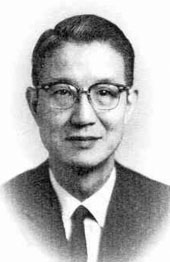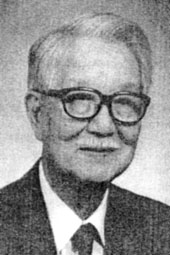
Andrew Yoshinobu Kuroda (December 29, 1906-February 19, 1997), the first an* ordained Unitarian minister of Japanese ancestry in the United States, served the Japanese Unitarian Fellowship at All Souls Unitarian Church in Washington, D.C. He was also, for thirty-five years, a cataloguer, bibliographer, reference librarian, and head of the Japanese Section at the Library of Congress.
Andrew was born in the coastal naval port of Yokosuka, Japan. His father Korenobu, a Christian minister, was a graduate of the Theological School of Meiji Gakuin College in Tokyo, and his mother Kura Oshiro was a teacher. As a child Andrew was active in his parents’ conservative Calvinistic church. After grammar school he went to his father’s alma mater, majored in literature, and graduated in 1933 with an A.B. equivalent.
During his last college year Kuroda decided to become a minister. After graduation he audited several courses at the Japan Theological Seminary. “That,” he said, “was the beginning of my intellectual inquiry into Christianity.” With his father’s blessing, in 1934 he attended Auburn Theological Seminary in Auburn, New York, where he earned his B.Th. in 1937. The next year he received an S.T.M. from the Biblical Theological Seminary in New York City and was ordained in Auburn by the Cayuga Presbytery, Presbyterian Church, U.S.A.
Kuroda early came to appreciate the individual freedoms and rights accorded every American and determined to become, as soon as he could, an American citizen. Thus he elected not to return to Japan but instead served the Japanese Methodist Church at Wapato, Washington (in the Yakima Indian Reservation), 1938-41. In 1939 he was granted Methodist fellowship by the Pacific Japanese Provisional Annual Conference. He there met Julia Noda, a graduate of the University of California and a librarian. They were married in 1939 and had two children.
Kuroda’s next assignment was the Salem Japanese Community Church, in Salem, Oregon, 1941-42. When, as a result of the war with Japan, President Franklin Delano Roosevelt issued his Executive Order 9066, interning all Japanese Americans in special camps, Kuroda and his family were forcibly removed to Tule Lake Relocation Camp, in Newell, California. Later, asked why Japanese American citizens did not resist this order, Kuroda explained that “We were concerned about our safety—the threat of reprisals against us was always on our minds.”
When Kuroda agreed to take a pledge of allegiance to America, five men whose loyalty remained with Japan beat him up. As a result he and his family were transferred to the Granada War Relocation Agency Center in Colorado and then, at his own suggestion, to Broomfield, Colorado, where his wife’s parents had been placed.
At the Army’s request, Kuroda became a Japanese language instructor at the Army Language School at the University of Michigan, 1943-44. He was next made a Research Analyst in the Office of Strategic Services, stationed first in New York City and then, until the end of the war, in the China-Burma-India theater of Operations. His final military assignment was as a member of the United States Strategic Bombing Survey, working in Washington and Japan, which surveyed the morale of the Japanese whose lives had been affected by the dropping of the two atomic bombs.
Discharged in 1946, Kuroda returned to Washington and began working as the Chief Cataloger in the Japanese Section of the Orientalia Division at the Library of Congress. In 1959 he was made its bibliographical and reference librarian; in 1965, Head of the Japanese Section; and, in 1977, Field Director of the Library of Congress in Tokyo. He retired in 1981.
As he pursued this work, Kuroda continued his ministerial calling to the Japanese community in Washington: first at the Japanese Christian Fellowship, First Evangelical and Reformed Church, 1946-54, and then at the Japanese Christian Fellowship, Grace Reformed Church, 1954-62. Over these years his understanding of religion evolved from the faith of his childhood to the liberal Christianity of Unitarianism. As he explained in his sermon on why he became a Unitarian, “To me, a religious quest is a quest for the truth. Truth is one, but man’s understanding of truth grows with the progress of mankind. I cannot believe that truth can be shut up in the narrow confines of any system of thought. . . . I cannot suspend my religious quest in order to defend and to preserve traditional Christianity. . . . That is why I have decided to become a Unitarian.”

Unitarian Universalist fellowship was granted to Kuroda in 1962. He preached to various churches in the greater Washington area before joining the staff of All Souls Church in Washington. Most of the members of his previous fellowship soon joined him. In 1964, when* he was installed as Minister of the Japanese Unitarian Fellowship at All Souls, he became the first Unitarian minister of Japanese ancestry in the United States.* Duncan Howlett preached the sermon and James Reeb gave the prayer.
Kuroda’s ministry was always to a small group and for a unique purpose. As Leon C. Fay noted, “the strategy of the group is to acquaint people who only speak the Japanese language with the principles of the Unitarian Universalist movement, and as they gain more facility with English, have them move on and ultimately join a more established Unitarian Universalist church.” The by-laws of the fellowship stated that it was a gathering “of free minds, having for its object the study and practice of liberal religion, the development of the higher life of its members, the promotion of the brotherhood, justice and peace, and the building of a better community and world.” Kuroda served this congregation until 1976, when his new position at the Library of Congress took him to Japan.
In addition to his church and library duties, Kuroda pursued several special projects. He worked to open cemeteries to all people, regardless of ethnic background. He officiated at funeral services in Arlington National Cemetery for Japanese-American soldiers. He was active in the Japanese-American Veterans Association. As a naturalized citizen—he was granted citizenship in 1955—he founded the Joseph Heco Society of America, in memory of the first individual from Japan naturalized in the United States. Throughout his adult life he labored tirelessly, in the United States and Japan, to promote friendly understanding between the peoples of both countries. In 1985, to recognize this effort, the Emperor of Japan named him a member of the Order of the Sacred Treasure.
Kuroda was a quiet, gentle, private, and thoughtful person. He loved reading, classical music, and theater. He died at 86 of congestive heart failure. A memorial service conducted by the Rev. Roger Fritts was held at the Cedar Lane Unitarian Universalist Church, Bethesda, Maryland. Kuroda’s wife donated his extensive collection of Japanese and English books, covering the fields of history, society, politics, foreign relations, and science, to the University of Maryland Libraries East Asian Collection.
*February 14, 2017 correction: It was originally reported that Kuroda was the first ordained Unitarian minister of Japanese ancesty. Incorrect text has been struck through. Watari Kitashima was ordained in May 1894 by the First Congregational Church of Vineland, New Jersey (see Frank D. Andrews, A Historical Sketch of the First Congregational Unitarian Church of Vineland, New Jersey (1919) page 14).
The Unitarian Universalist Association Ministerial File on Andrew Kuroda is at the Andover-Harvard Theological Library, Harvard Divinity School in Cambridge, Massachusetts. It includes several of his printed sermons. The Andrew Kuroda Collection is in the Veterans History Project, American Folklife Center, Library of Congress in Washington, D.C. With Roger Pineau, Kuroda translated Masanori Ito and Roger Pineau, The End of the Imperial Japanese Navy (1962). See also Laurence Carlton Staples, Washington Unitarianism: A Rich Heritage (1970). There is an obituary in The Washington Post (February 27, 1997).
Article by Alan Seaburg
Posted January 31, 2007